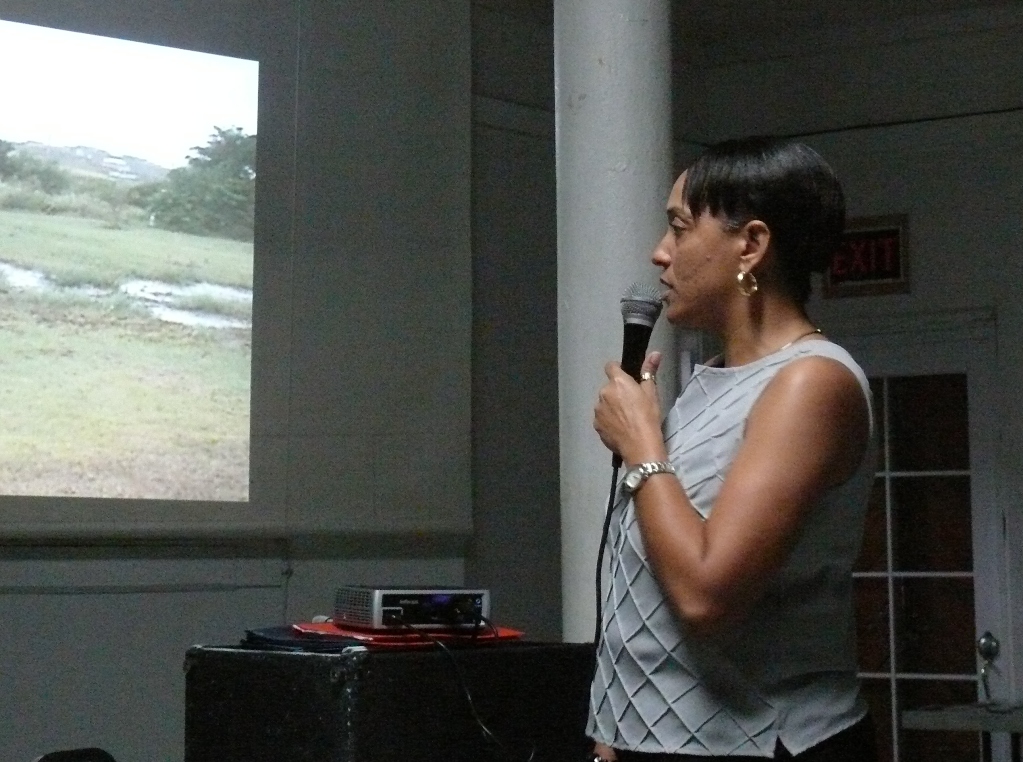
A non-point source of pollution is any of the many sources of contamination to water guts, erosion and silt runoff, scattered sewage leaks and any pollution source that is not tightly bound to a particular spot, like the end of a pipe pumping effluent, molasses or chemicals into the sea.
The grants are funded by the U.S. Environmental Protection Agency and are called 319 Grants, for the section of law establishing them. The program has been around for a number of years, but this year there will be more than usual available, so DPNR will be ramping up the effort and encourages community groups, such as Rotary West, to work up specific, practical projects and to apply.
Every public school in the territory has already been allocated $4,000 for school-based projects, she said, and in May there will be a town meeting on St. Croix with more details on how to apply and what funds are available.
To qualify, a group will have to submit a basic plan for pre-approval to DPNR. If approved, then groups would submit a final detailed plan for the project, with costs, a specific benefit and a time frame.
Once everything is in place and ready to go, DPNR will release the first part of the funding, then release the rest as progress is made. Once the project is done, there will have to be a project report or summary, ensuring everything was done according to the book, she said.
"In some cases, a grant has been awarded but then not spent," she said. "So when that happens, I do ask for the money back. I’m a stickler for the procedures and records. We have to have proper procedures."
Projects can be anything that reduces non-point source pollution: setting up gabion baskets (chain-link baskets filled with gravel to stop erosion from a damaged hillside), cleaning up a gut, fixing a damaged septic field, or anything else of a limited, practical scope.
Meanwhile, DPNR is in charge of enforcing regulations to prevent runoff and other non-point source pollution, she said. For instance, in the U.S. Virgin Islands, erosion is a major problem, Capehart said, showing photos of bays and inlets where the water turned brown after heavy rains. Construction, debris and changes to natural water guts and digging at rock quarries are among the major sources of silt and other runoff.
Anyone who is planning any construction must get an earth-change permit from DPNR, she said. If more than one acre is being cleared, a more detailed and involved storm water permit is needed.
"If you know anyone doing construction and they do not have a permit, you need to tell them to get one," she said. The permits require holders to take measures to minimize runoff and erosion. Just what permit holders need to do will depend on the layout of the land and the particular type of construction planned. Silt fences (fabric fences set into trenches across the path of flowing rainwater) and porous erosion control mats are common techniques for building sites. Larger projects and work on hillsides may incorporate more substantial and longer-lasting systems like the gabion baskets described above.
Farmers have a big impact too, she said.
"We try to tell farmers to keep their animals out of the guts, because when it rains, their waste gets washed into the ocean," she said. "Overgrazing is also a problem, leading to erosion."
Rock quarries, industrial sites and commercial construction all play a role, too, she said, showing photos of a quarry and of dirt water running into the sea off both St. Thomas and St. Croix after heavy rains last fall.
Septic systems can be a problem too, she said. "Often people will expand a house or add apartments without proper permits and will not expand their septic system appropriately," she said, showing a photo of a sodden, non-functioning septic field on St. Croix. Marinas on St. Thomas and St. Croix that have people living on their boats can also contribute.
"The law says boaters have to go at least three miles offshore to dump their sewage, or have it pumped out at the marina," she said.
On May 6-7, DPNR is hosting a non-point source pollution conference on St. Thomas at Wyndham Sugar Bay, where residents, groups and businesses can find out more about the problem and solutions, she said.
On a different environmental subject, Capehart said that as part of the V.I. Resource Conservation and Development Council, she is seeking young students to apply to go to a free conservation camp in Georgia this summer.
Every June the council sends nine or 10 students to the Georgia camp, where they offer all sorts of conservation workshops and field trips. "It is some intense training for them," she said. "And it is completely free. We only have two applications so far, so we encourage students at both the public and private schools to apply."
Children ages 15 to 17 can apply to go. Each student applying must write an essay explaining why they want to go. This year’s deadline is March 31. Applications are online at http://www.usvircd.org/.
DPNR to Empower Groups to Help Clean Up Territory
Keeping our community informed is our top priority.
If you have a news tip to share, please call or text us at 340-228-8784.
If you have a news tip to share, please call or text us at 340-228-8784.
Support local + independent journalism in the U.S. Virgin Islands
Unlike many news organizations, we haven't put up a paywall – we want to keep our journalism as accessible as we can. Our independent journalism costs time, money and hard work to keep you informed, but we do it because we believe that it matters. We know that informed communities are empowered ones. If you appreciate our reporting and want to help make our future more secure, please consider donating.





